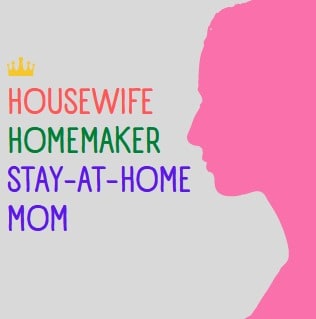When it comes to a housewife, our society has a well built and well-defined set of standards.
After Asr prayers she usually felt tired but, today she was bone-weary. “What if I rest for half an hour?” she thought, but, she was already running behind the schedule. The chores were all lined up and she knew she would not be able to finish up in time. Kids needed help in their homework, elders needed their tea in an hour and dinner was to be prepared as well. As usual, like every day, she thought to herself, “I’ll try to sleep earlier tonight, then maybe I’ll feel better tomorrow.” Although she knew it wasn’t going to happen. Her rest and desires were long being lost in the humdrum of her role at her household. So many people were dependent on her in so many ways; even thinking about her own comfort made her guilty.
The majority has difficulty chewing on the word, ‘housewife’. To many women, it’s just like a punch in the face, an insult to digest, a label for an inexpensive brand. “I’ve never liked this word; I feel that it’s used to tell that the person is without any professional or specialized knowledge,” says Rabbia, a housewife for 7 years. The word, in general, has never been able to gain any attention or a special connotation, whoever it is associated with. With times, there are some appealing alternatives available as far as the title is concerned: homemaker and stay at home mom. However, modifications in the title have never been able to bring any major change to the image and job description of this designation in our social order. “I think in our typical Pakistani society, the word housewife means an unpaid maid for life, and I don’t believe this image has or will ever change,” says Sadia, a housewife for 12 years. Yet, some women believe that they’re somehow, better housewives than the generations before them, as they’re educated and have a say in the major decisions of their homes. As per Maha, a home-maker for 3 years, “Housewives these days, are aware of their rights and responsibilities. They tend to take care of themselves and are more involved in the upbringing of children. Some can drive their cars and support their husbands by managing the chores outdoors.” The impression of inutility, associated with the title has shrunk according to such housewives.
The decision of becoming a housewife, in most cases, is taken by others. It may be the excuse of household norms or the old and kids necessitating her presence; rarely women choose freely.
A huge number of housewives want to work if given a chance. Amna, a housewife for 14 years, says, “It was my decision, backed by my husband’s wish. Being a doctor, it was too hard for me to balance between my job, my house, and my post-graduation. Since giving 100% at all these fronts simultaneously was impossible, therefore, one aspect had to suffer; so I gave up on working.” When it comes to a housewife, our society has a well built and well-defined set of theoretical standards. There are certain expectations and implied limitations. It’s not that we have failed to evolve with the rest of the world. It’s just that, we’re far behind in defining the sources of strength for one of the most important pillars of every family. There’s a rigidity, in the society and every household; matters, chores, tasks, no matter how trivial, are to be managed in a certain way. Ironically, these standards have been achieved by a senior housewife, expected to be followed without any change by the junior; a way of older women trying to maintain their hegemony. “The decision of my being a housewife was taken by my mother in law. I had a good job before marriage and I wanted to pursue my career. The reason given was that in their family a working woman is always frowned upon!” shares Maira, a housewife for 9 years. The vested interests have made our traditions, a tool to maintain the status quo for women.
Apart from the standards, passed from one generation to another, such austerity has its roots in the joint family system as well. There are many marital strains that relate to anxiety, parent-child conflict, or domestic violence. It has been observed through various researches, that living in a joint family system has much influence on these matters. Women feel that they’re denied their independence and free will, especially in the initial years of marriage. As Komal, a housewife for 7 years puts it, “If I’m given a choice, I would live in a nuclear family set up. It’ll solve about 80 percent of my problems.” Although the joint family system has its advantages, it comes with complications as well. Naila imparts, “The joint family system comes to us from India. It has nothing to do with religion. It’s meant to oppress the women and gives an upper hand to the ones earning the most in a family. Rational families realize that everyone needs space and privacy. The gap, between the generations living together, incapacitates the development of wavelength. Needless and disruptive intrusions in joint families cause disagreements and brawls.”
Marriage, in our society, comes with a lot of changes in a woman’s life. On becoming a wife, one is expected to be completely selfless. Hobbies, careers, and personal care are merely empty words. Maria remarks, “I ignored every single thing that I once loved or enjoyed. The person I used to be before marriage has long been dead.“ Regrettably, even after ignoring themselves and forgetting about their own preferences, a common emotion suffered by the majority of housewives is — the feeling of worthlessness. One hardly gets a single word of appreciation or any acknowledgment of one’s efforts. The toil is not taken seriously or probably it’s never been important to realize as to how much of psychological and physical burden, a family overall is putting on a person. She is supposed to meet up to the expectations and even upon meeting, it’s ridiculous to expect a word of indebtedness. Reasonably, it’s because the idea of ‘care’ is historically tied with women and if a person is essentialist (believes woman’s space is home), he would take that caring for granted, as part of a woman’s essentialist things to do. Sana Ajmal, a foreign qualified, practicing Psychotherapist says, “The assumption of a woman in Pakistani society is that she must hone her skills to become a good wife. Despite being highly qualified, women take up being housewives in order to cater to the household chores and duties. It leaves them feeling intellectually dejected and exploited. It limits their chances of growth and success. This lack of a sense of accomplishment leads to depression in women. The culture of meekness and subdued self-expression, actively promoted among women, leads to feelings of despair and apathy.”
International researches reveal that housewives are worth $200,000 a year; with nearly 96 working hours per week, making them the most valuable workers in any country. However, the situation in Pakistan isn’t the same. Even after working 126 hours weekly, the due significance is denied. “If given a chance, I’d give myself the liberty to decide for myself, to make my own decisions without looking at others for approval. I would choose to earn for myself so that I don’t feel like a burden on anyone,” states Maheen, a housewife for 9 years. Housewives face the constant realization of not been able to be financially helpful in a household. Ignoring the fact, that because of their intellect and skills, the budget and expenses are manageable. “Women in Pakistan, especially belonging to the middle class, are often well educated. However, education for women is also about paying lip service to the established social norms of being perceived as civilized, rather than any real effort towards the emancipation of women.” asserts Sana Ajmal.
The educational degrees, while getting stale, start to give out a stench that keeps pricking in the subconscious, making them realize how wasted they are!
In previous generations, it was a norm to be a stay at home mom, but with the time, women working in almost every field of life, have started giving a competition to the housewives. Javeria, a housewife for 6 years remarks, “We get to hear things like, what’s the use of doing your Masters if you were to only raise a family! Many times I’ve been told that I’m wasting my talents and questioned as to what do I do all day! I think we are judged more often now.” The statement indicates the typical mentality where education is seen as an investment, a method to get hold of a job, instead of personal learning and growth.
There comes a comparison of whether working women lead a better life as compared to the housewives. Aleena, a housewife for 13 years says, “Better in the sense that there is financial independence, one has a friends’ circle, a life outside the home which brings positivity. Worse in the sense that one has to take more responsibilities. We know how our society works; if a woman makes money she isn’t exempted from the house chores. A woman may work after her marriage, but a mother shouldn’t. Her absence from home affects everyone, including herself.” Sana Ajmal affirms, “Women who do work in jobs and earn the resources to provide for the standards they live by, are often overworked and stressed, facing anxiety and burn out.”
The social pressure on working women for not being able to be an ideal housekeeper is equally applicable in the case of a housewife, for not being able to pitch in some money.
Either way, women are sent to guilt trips. They’re expected to be super-humans who can manage themselves, work, home, kids, husbands, in-laws, and social lives simultaneously. A challenge no Pakistani man has to face. “For six months, I tried leaving my job and becoming a housewife. I felt like I’d lose my mind. The endless chores frustrated me. I worked all day, every day, but there was no reward, no compassion, and no credit. In a normal scenario, if we work, we deserve some remuneration; for housewives, it’s just not thought to be necessary. I wonder why women have been surrendering to such a lifestyle!” says Iram. Sense of achievement is altogether missing from the lives of housewives. No matter how much independent working women are assumed to be, as the grass is always greener on the other side; the patriarchy prevails. Asma, a working woman for 20 years confesses, “I always give my salary to my husband, or to be exact, he takes it; and although I despise him for that, I can never openly object against it. I manage both work and home, but it’s a norm for him to mock in my ways. He doesn’t leave any chance to mention that it’s because of his broad-mindedness that I can go out to work.”
The most depressing as well as alarming fact surfacing up is that 97% of our homemakers feel or have felt homeless, at some stage of their married lives. After marriage, women have to create a space for themselves in a set-up, which is different from where they come from. They go through a lot in doing so. Women face the ultimate depression of not being able to stand independently, even after giving their whole lives to their households. “To be very honest, ever since I got married, I’ve found myself to be homeless. My parents’ house is no longer mine, husband’s house belongs to his mother and sisters and they often make me realize that too. So yes, I’m definitely homeless!” says Afifa, a housewife for 3 years. Saira, a housewife for 16 years, confesses regretfully, “All these years, I’ve been assuming that I am making my home, but I do apprehend today, that at the end of the day, I don’t have any home. For shelter, I’ll be dependent on my husband and then my children.” The whole of society has contributed to creating this depressing state of affairs. “I’ve dedicated 19 years to my marriage, my home, my husband, and family. But, if one day I decide to take a break, do something for just myself, quit doing the usual, assigned chores; there’s no place for me in the same marriage, the same home, and the same family. They all expect me to live in a certain way. In case I want to stop meeting their expectations, I’ve literally no place to go.” says Zainab. Aima, a housewife for 14 years, puts it quite sarcastically,
“The feeling of being homeless couldn’t hit me hard.Thanks to the parents who kept telling us, ‘aurat ka koi ghar nahin hota’ (a woman has no home) and the infused insecurity in the back of our minds.”
This hunch of infirmity and powerlessness in wives and moms, can’t bring anything positive. Homelessness incorporates feeling dispossessed, displaced, destitute and these are all hard to ignore. It’s is a premonition. It’s an alarm that has been put on snooze multiple times. It has been going on this way for decades – a woman has no home; she’s to rely on the male members of her family, which are clearly a failure in guaranteeing the rights and sense of security. On every rift, there’s a fear at the back of her mind, that she has no home. She’s bound to tolerate even the severest of attitudes and still reside under the same roof, as she has nowhere else to take refuge in. The home she had earlier, bid adieu on the day of her marriage and has no space for her. A woman in our society is destined to stay dependent. Once again the traditions support the oppressors, by not sanctioning her to stand tall, live alone, all by herself. Thus, to conserve the supremacy, a woman is not allowed to have a home and, if she earns to make a home, she is frowned upon and called names. There’s an escalating agitation among women which will prove to be ominous for the structure of our society. The increasing percentage of divorce and separations is living proof of it.
The frustration shadows the upbringing of children as well. Mothers, who proclaim their offsprings as the only source of satisfaction in their lives, are often seen yelling and even hitting young kids. A mother never wants to hit or even scold a child, but the pressure of managing everything, maintaining the discipline of life, keeping everything intact and everyone happy is too much to handle. Women start to lose their patience and composure. This leads to many other complications. Wifehood takes over motherhood. Many mothers are living with the guilt of not being able to spend enough time with, or be enough kind and pleasing to, their kids. Anxiety, depression and similar mental issues are branches of the same tree. The cruel factor is that none of the mental issues are diagnosed and cured. Sana Ajmal shares, “Seeking therapeutic help with regards to anxiety and depression is still considered to be either a taboo or a luxury which most of the women would not afford themselves to have. Mental health issues are treated as non-issues in our society. They are often swept under the rug, with many women left feeling helpless in the face of growing stresses leading to depression, anxiety, compulsions, and a general lack of vitality.”
It’s saddening, that as a society we have not been able to create safe spaces for the most important pillar of households – the women! Religion, no matter how much we like to profess as living our lives adhered to, has always lost the battle to the culture and customs. Not to follow the West has been the focal point, although the sanity wishes if for once, we could unfollow the East i.e., Indian norms after 1947, and evolve on our own reasoning. The practice of living in a joint family system should be discontinued, where required. The right of inheritance should be paid attention to. Women feel homeless because they don’t inherit anything! It is the religious and moral obligation of the parents to give their daughters what they are legally entitled to. It is so unfortunate that such an important religious duty has always been, deliberately, overlooked by the parents. The awful tradition of spending a fortune on weddings and ostentation, done to fuel their own ego, makes the parents think that they’re no more liable to give their daughters their legal share in the inheritance. The practice of living with sons makes the daughters and their rights insignificant. It is so important to stay in the good books, that it’s common for parents to give away daughter’s rights to maintain cordial relations with sons.
It’s time to emerge as a society that has the courage to re-build its traditions, comprehend the importance of stability of every female member, and have many havens for our women. Professional education for the girl child is a necessity. That’s one of the most successful ways a woman can be psychologically stable and financially strong. If a woman is financially independent, she can raise a better family, be balanced, and thus be more productive as a family member. By financially independent, it doesn’t necessarily imply that she should be a working woman. Although taking as a perspective, if a woman is career-oriented, she can hire house-help to manage the house and still supervise the well-being of her family. The rights granted under the Nikah such as a reasonable amount of regular pocket money, haq meher, right to terminate the marriage and other such essentials should never be neglected. It’s mandatory upon every husband, religiously and legally, whatever his pocket allows, he should have a decent share from his income, just for his wife, explicitly. Saying that ‘whatever I have is yours’ is merely an emotional tactic!
Taking up the challenge, women need to give due importance to the magnitude of their roles in creating a healthy balance in every life around them. Discourage gender inequality in household chores. Instead of taking so much pressure, take charge and steer the family members to manage their own chores, to an extent where, instead of taking for granted, they can at least learn to empathize and value the physical, psychological as well as intellectual efforts of a wife, daughter in law, or a mother. Acknowledgment, appreciation, and respect are the missing ingredients in the most authentic recipe for a healthy relationship, leading to a happy family. One word of admiration, one gesture of respect and affection a day, can bring positivity. The frustration which the word ‘housewife’ holds in itself is an ailment and it should be cured not just with gratitude and empathy, but with a strategic upgrading. This has clearly not been a part of our tending as family members. We’re not taught to be considerate as humans. Alas! We’re a culturally condemned nation. We leave no chance to hurt others and particularly the ones who are a part of our lives. We think appreciating someone will bring some kind of loss to us. Especially the women should learn to support other women around them. They should keep each other’s back and build solidarity among themselves. Bashing each other just because there’s a difference of opinion is a disgrace to the womanhood itself. If we train differently, our coming generations can make a difference. Moms of today will be determining the ethos for the moms of tomorrow. Getting rid of the forbids and prohibitions should be the aim. Early employment during studies supports the process of gaining confidence, economic sense, and thus self-determination. It’s happening in the developed countries where women have gained strength by breaking the socially obstructing shackles.
Our domestic system requires a shift. It is not just a lack of acknowledgment. It is a lack of financial independence, having time for one’s self, having a sense of purpose besides household chores, and these issues are to be resolved with deliberately doing things in a constructive way.
Sana Ajmal recommends, “On a personal level, the solution in my view lies in becoming aware of one’s defeatist thought patterns. Women should educate themselves about the rights accorded to them by religion and our constitution. They should also use positive self- affirmation such as, ‘I’m good enough’, ‘I deserve to be happy’, ‘it’s ok for me to seek happiness and fulfillment’, ‘I can be different from others’. Our society is becoming progressive with regard to mobility for women as is evident from the number of young professional women living in the bigger cities of Pakistan. The options to work from home, adopt innovative businesses, and online education are limitless. Paying close attention to our restrictive mindset would lead to a more fulfilled and happier life for Pakistani housewives.”
Author’s note:
Thanks to the taboos and social stress prevalent in Pakistani society, most of the interviewees and interlocutors have preferred not to disclose their true identities.
The writer is a lawyer and freelance writer.














